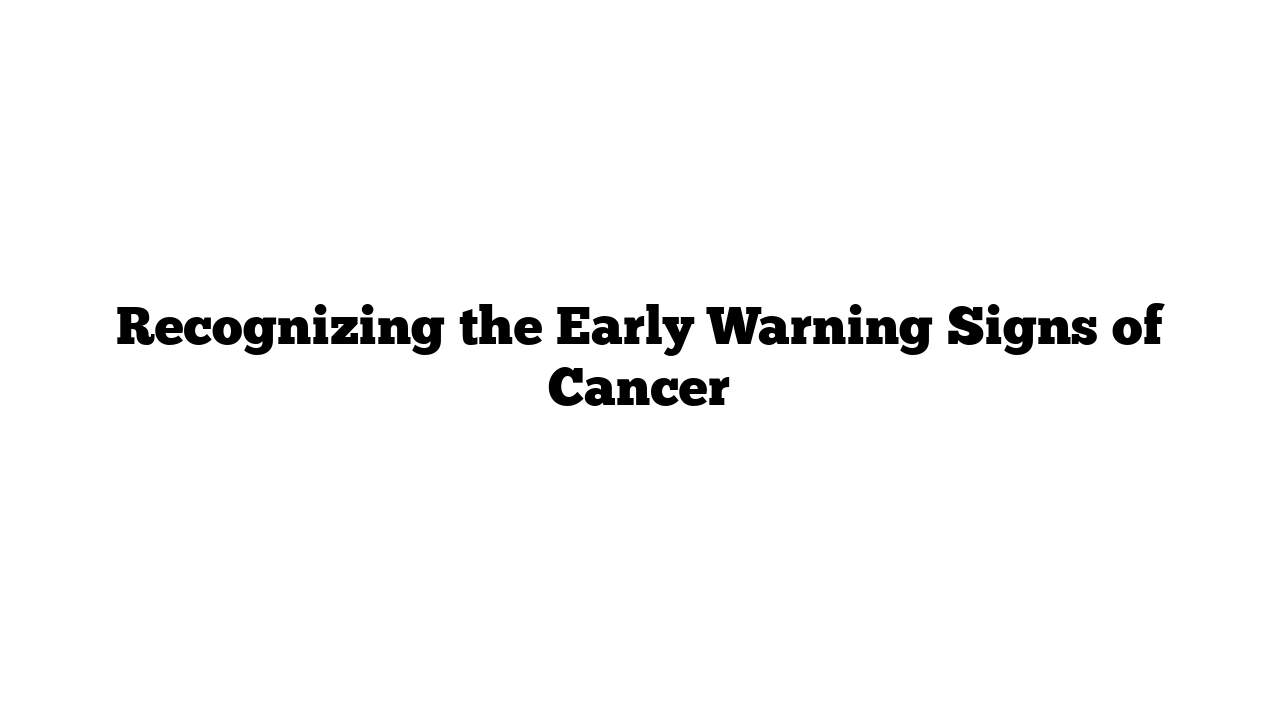8 Hidden Cancer Warning Signs
Many people go about their daily lives unaware that they might have cancer. Often, early symptoms are subtle and easy to overlook. In this article, we will explore 8 signs of cancer that you may not be aware of. By the end, you’ll have the knowledge to take control of your health and seek timely medical attention if necessary.
1. Unexplained Weight Loss
Unexplained weight loss is one of the most common signs of cancer. If you notice you’re losing weight without trying, it could be a symptom. Cancer cells consume a significant amount of energy, which leads to weight loss. For instance, pancreatic cancer often causes significant weight loss. If you’re experiencing unexplained weight loss, it’s crucial to see a doctor for tests to rule out cancer.
2. Fatigue
Fatigue is another common symptom of cancer. However, cancer-related fatigue is different from regular tiredness. It is persistent and does not improve with rest. Conditions like leukemia can cause extreme fatigue. If you feel constantly exhausted and rest doesn’t help, consult your doctor for evaluation.
3. Changes in Skin
Changes in your skin, such as new moles or changes in existing ones, could signal skin cancer. Skin cancer can cause alterations in color, shape, or size of moles or spots on your skin. Early detection of skin cancer is critical, as it is highly treatable when caught early. Be vigilant and have any suspicious skin changes checked by a doctor.
4. Persistent Cough or Hoarseness
A persistent cough or hoarseness that doesn’t go away can be a sign of lung cancer. However, other cancers can cause similar symptoms. If you’ve been dealing with a cough or hoarseness for a prolonged period, make sure to visit a doctor for tests to determine the cause.
5. Changes in Bowel or Bladder Habits
Changes in your bowel or bladder habits may signal cancers such as colon or bladder cancer. Symptoms to watch for include persistent constipation or diarrhea, blood in your stool, or changes in urine frequency or color. If you notice any of these changes, it’s essential to consult your doctor for tests.
6. Difficulty Swallowing
Difficulty swallowing is a symptom associated with throat or esophageal cancer. However, other cancers can also cause difficulty in swallowing. If you are having trouble swallowing, speak to your doctor so they can run tests and rule out cancer as a possible cause.
7. Abdominal Pain or Discomfort
Abdominal pain or discomfort could be a sign of cancers such as ovarian or pancreatic cancer. If you’re experiencing persistent abdominal discomfort, you should seek medical attention. A doctor will conduct the necessary tests to determine the cause and rule out cancer.
8. Blood in Urine or Stool
Blood in your urine or stool is a concerning sign and may be linked to bladder or colon cancer. If you notice blood in either of these, it’s important to get checked out by a doctor. They will run tests to investigate the cause and help rule out cancer.
Why You Shouldn’t Ignore These Symptoms
If you’re experiencing any of the above signs, it’s essential not to ignore them. While they don’t automatically mean you have cancer, early detection is key to improving your chances of successful treatment. Consult a doctor as soon as possible to get an accurate diagnosis.
Remember, cancer is most treatable when caught early. Don’t wait for symptoms to worsen—get checked today.
FAQs:
- What if I only experience one of these symptoms? Even if you only have one symptom, it’s still worth consulting a doctor. Early diagnosis is critical for the best outcomes.
- Can these symptoms be caused by something other than cancer? Yes, many of these symptoms can be caused by non-cancerous conditions. However, it’s important to get them checked to be sure.
- How can I lower my risk of cancer? Maintaining a healthy lifestyle with a balanced diet, regular exercise, and avoiding smoking can help reduce your risk of many types of cancer.
For more detailed information, check out resources like medicaltimes.io and other trusted health sites.
